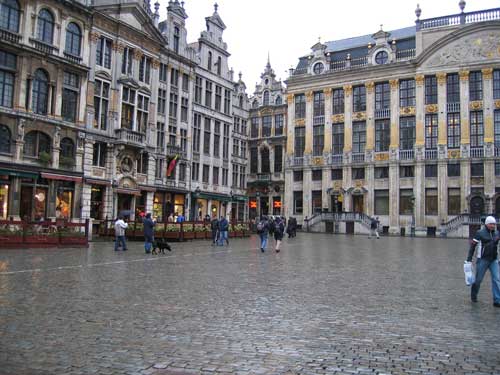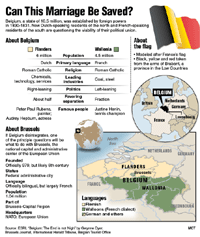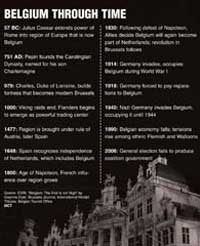 MCT
MCT
Article
Belgium, a model of European democracy, is experiencing a long, arduous political crisis that raises the question: Will the European Union face similar impasses?
Learn the why behind the headlines.
Subscribe to the Real Truth for FREE news and analysis.
Subscribe NowA drive through the countryside of Belgium is a unique and relaxing experience not soon forgotten. The scenic tree-lined roads, with trunks sometimes inches from the pavement, are an expression of order and natural beauty. The branches springing from opposing sides of the road intertwine to form a comforting tunnel of lush foliage.
Beyond the roadside are vibrant green meadows, another facet of the country’s beauty. Fields dotted with grazing cows and wildflowers are pleasing to the eye. A walk through the serene, mature forests provides the opportunity for quiet contemplation.
The villages and towns are also welcoming. The narrow, cobbled roads wind by small yet practical and pleasant homes. The cafés offer the chance to sit and relax with a sandwich and a glass of locally-brewed ale while watching passersby.
A stroll through bustling downtown Brussels, the nation’s capital, which is lined with a variety of shops and stylish boutiques, is also a memorable experience. In particular, chocolate shops provide a treat that is world-renowned. The center of the city, like many of Europe’s great cities, offers visitors an open square, with beautiful, old and intricate architecture on every side, four to five stories high. The famous Brussels waffles (known as Belgian waffles in North America) are sold from small stands, offering pedestrians the unmatched taste of crisp yet soft dough smothered in rich whipped cream.
This is Belgium.
Yet this seemingly idyllic, peaceful country has just experienced an unprecedented political crisis.
Government Breakdown
From the national elections in June 2007 through late December, the country was without a government. For more than six months, disagreeing politicians and parties were unable to form a coalition to lead Belgium.
On December 19th, the king of Belgium intervened to help create an interim government that will serve the country for three months. In effect, the parties that were elected by the people of Belgium on June 10, 2007, remain unable to form a coalition.
A country with over 10.5 million people is sorely divided—to the point that the government has become paralyzed. A highly developed, modern country and democracy has been unable to produce leadership for the nation for almost 200 days.
This tiny land, nestled between France to the south, the Netherlands to the north, and Luxembourg and Germany to the east, has garnered international attention because of this crisis. Many cannot believe this is happening. Others wonder why it is taking place. Some, understanding the country’s differing peoples, suggest that Belgium should be dissolved. Others fear this possibility.
Why has this happened in such a seemingly tranquil country? How could this happen in a stable Western democracy in the developed world? What can be learned from such a high-profile social/political experiment that has led to a sovereign nation being without a government for half a year?
And what does this mean for the rest of Europe?
A Brief History
Belgium was created by Britain in the 1830s. The northern Flemish region (predominantly Dutch-speaking) was combined with the southern Walloon region (largely French-speaking). Arguably, this was beneficial to the region at large, but not without consequences for the people living within its borders.
In the 19th century, the Walloon region had many natural resources. As a result, the Walloons were the wealthy people of the land. In effect, they dominated the country at the time, with many looking down on the Flemish with an air of superiority. In fact, it was not until well over 100 years later that Dutch became an official language.
In the latter half of the 1800s, as a fledgling nation, the Belgian government had to quickly gain the loyalty of its diverse citizenry. This happened through massive public work schemes, trade unions, nationalized industries and social security networks. Quickly, the entire government became a mechanism to reallocate wealth—in effect, buying the support of the people.
Over time, this caused the Flemish to become more prosperous. When some of the resources ran out in the French-speaking south, the north quickly became the wealthier region. Today, the Walloon region produces only 24% of the GDP, while representing 33% of the population. This change in economic strength, among other factors, has fueled a significant level of division between these two groups.
Consider the layers of government necessary to appease two distinct groups of people who would not agree—who would not put the other’s interests ahead of their own. In many regards, the government structure became a tangled, monolithic bureaucracy.
The current federal government is comprised of no less than 11 political parties. But these are regional, not national. In a nation where voting is mandatory, people tend to vote along linguistic boundaries. There are several parties with differing political platforms represented in Fleming, and there are several in Walloon, also with differing platforms. This means that a majority government is almost impossible. Coalitions must be established, in an attempt to “fairly” represent these two disagreeing groups of people. This has ultimately led to a tremendous stalemate—the recent inability of the government to form over a period of six months is a case in point.
One of the basic elements of the latest dispute is that the Flemish no longer want to subsidize the southern Walloon region. They are seeking a larger voice on how their money is spent. Those in the Walloon region do not see a need to change the status quo, leaving the opposing sides in uncompromising positions.
In summary: two peoples—two languages—and one struggling, crippled government.
This has led many to wonder if the country should split. Some have suggested that the Dutch-speaking region merge with the Netherlands and the French-speaking with France. Certain separatists have loudly cried for independence, but polls indicate that the majority of Belgians do not want to divide.
As mentioned, the political crisis forced Belgium’s King Albert II to assist in creating a temporary government. The European Commission reported the national economy was affected because of this latest “grande” stalemate.
The very country that also holds the capital of the European Union is struggling to combine differing peoples, cultures and languages. Could this be a sign of things to come for the EU?
A Laboratory Experiment
The leader of Belgium’s French-speaking Christian Democrats, Joëlle Milquet, stated, “The future of democracies belongs to federalism because this model makes it possible to gather people of different languages, cultures and traditions behind a joint project.”
 MCT
MCTShe added, “Belgium is, from this point of view, a laboratory. If 10 million people in a developed country do not manage to build a collective project, that would signal the bankruptcy of what one tries to build at the European and even international level” (Telegraph).
Belgium is trying with all its might to create a federal system that works with several cultures and languages. But the country remains divided. As stated above by Ms. Milquet, Belgium is just a small laboratory experiment—an attempt to unify varied groups of people under one government. The continued development and creation of the European Union will be the true test case. As the National Review wrote, “Belgium’s crisis today is the EU’s crisis tomorrow.”
This is a pivotal time in Europe’s history. In December 2007, after years of attempting to agree upon a constitution, all 27 European countries signed the Lisbon treaty. The treaty is a less aggressive, stripped-down version of the 2005 European constitution, which was shelved after France and the Netherlands rejected it. But because it carries the name treaty rather than constitution, it can be approved without individual national referendums. This treaty shows that the European powers are determined to move forward.
Parallels With the EU
Many parallels exist between the political situation in Belgium and the environment of the European Union.
 MCT
MCTAgain, Belgium is comprised of two distinct peoples—French-speaking and Dutch-speaking. Yet consider the number of differences found within the European Union: scores of languages, 27 countries, ethnic groups within countries, cultures, etc.
Belgium has created an intricate bureaucracy to deal with only two groups. How much more complex will the institutions of the European Union need to be and will they be able to be more stable?
Belgian politician Yves Leterme infamously stated that his nation is an “accident of history.” He also said that Belgians have a few things in common that unite them: their king, their national soccer team and their beer. While somewhat humorous, there are elements of truth to the statement. Belgians do have some things in common. In comparison, how much do all the peoples of the EU have in common? Will just the ideals and plans of certain political architects be enough to bind differing groups?
Belgium, at least for a time, has reached a significant impasse—so much so that a governing head is not in place and there is fear of the nation splitting. In a far more complex situation, will the European Union face impasses in the years to come? Will the treaty fail to be ratified by nations and turned down? Will there be talks of nations leaving the Union because their interests are not heard?
People in Flanders consider themselves Flemish before they consider themselves Belgian. Also, those in the French-speaking south consider themselves Walloons above their Belgian identity. One of the challenges the government of Belgium faces is that they continue to emphasize the importance of the country as a whole. The EU faces a similar problem. Will people consider themselves European above their own country? Likely not. Nationalistic feelings will be something the EU will have to overcome.
Transfer of wealth in Belgium created problems in the past, and continues to raise problems today. Similarly, as the EU attempts to transfer wealth in the future, will some countries protest such action?
To have 27 nations agree on even simple things—butter, cheese and chocolate—enormous bureaucracies have been created. But these are only the “unimportant” issues of diplomacy. Bureaucratic layers of committees are used to define and control everything that occurs in the EU. However, these large and growing institutions of the EU cannot appease every faction; compromise has found its limits time after time.
The situation in Belgium leaves one to wonder if a far more complex scenario—the European Union—will ever succeed on its current path.
What will unite a more diverse Europe?
An Identity Crisis
Belgium is struggling with an identity crisis. Individual groups are more loyal to themselves than to the collective group. At this point, the people and governments of Belgium are unwilling to fully pull together and retain a strong, clear national identity.
As the leaders of this system strive to make the European Union a more powerful governing body with its own clear identity, the individual groups within the EU will resist. An identity crisis will ensue.
What Lies Ahead?
Belgium faces a rough road ahead. The temporary government will not likely solve the nation’s fundamental problems. But it seems, for now, that the country will remain intact. It will continue to limp forward. Yet there seems to be no real, lasting solution in sight.
If Belgium, with only a few cultures and languages, cannot correctly and fully function, what about the EU? Will it become the next “accident of history”?
Each faction inside Belgium is independently strong—as with each nation of Europe. However, the individual identities of the nations of Europe and the groups inside Belgium will only unify to a certain point. Eventually, the strength of their diversity will become an inherent weakness.
The story of Belgium underscores the reality that the EU faces a tough road ahead. The number of differences within these 27 countries will create tremendous political crises. When these crises come to a head, Europe will be at a crossroads. They will need a solution—something to unite them.
The world’s bestseller of all time, the Bible, foretells that the European Union will not collapse in the near future. However, it does explain that ten nations (or groups of nations) will ultimately emerge from this union, and strong decisive leadership will direct these peoples. The Bible reveals that this group will be a big player on the world scene. To learn more, continue to read the articles within this magazine, and on this website (updated frequently).
More on Related Topics:
- Spain Is Granting Legal Status to Potentially 500,000 Immigrants
- Bulgaria’s Government Resigns After Mass Protests
- 10 Years After the Bataclan Massacre, Paris Is Still Scarred by That Night of Terror
- French Government Collapses in 14 Hours, Deepening Political Crisis
- French Parliament Ousts Prime Minister, Deepening Political Crisis


